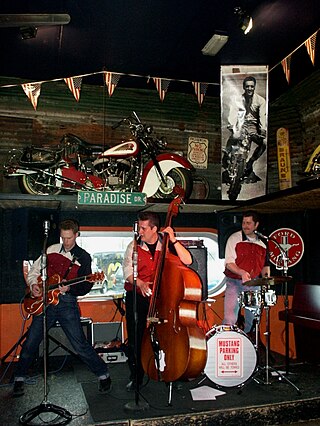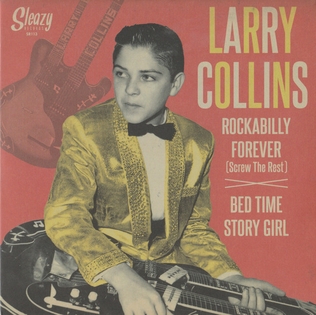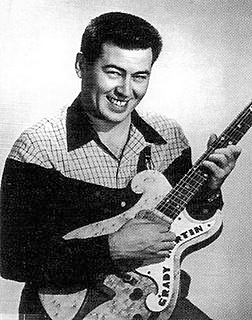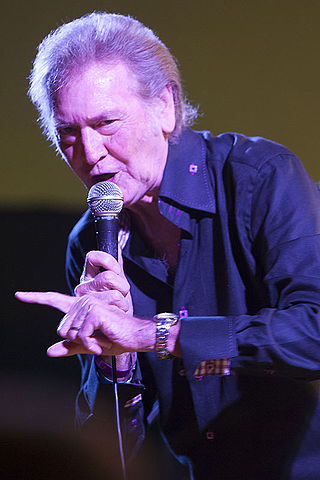Related Research Articles

William John Clifton Haley was an American rock and roll musician. He is credited by many with first popularizing this form of music in the early 1950s with his group Bill Haley & His Comets and million-selling hits such as "Rock Around the Clock", "See You Later, Alligator", "Shake, Rattle and Roll", "Rocket 88", "Skinny Minnie", and "Razzle Dazzle". Haley has sold over 60 million records worldwide. In 1987, he was posthumously inducted into the Rock and Roll Hall of Fame.
Country is a music genre originating in the southern regions of the United States, both the American South and the Southwest. First produced in the 1920s, country music is primarily focused on singing stories about working-class and blue-collar American life.

Carl Lee Perkins was an American guitarist, singer and songwriter. A rockabilly great and pioneer of rock and roll, he began his recording career at the Sun Studio, in Memphis, beginning in 1954. Among his best-known songs are "Blue Suede Shoes", "Honey Don't", "Matchbox" and "Everybody's Trying to Be My Baby".

Rockabilly is one of the earliest styles of rock and roll music. It dates back to the early 1950s in the United States, especially the South. As a genre it blends the sound of Western musical styles such as country with that of rhythm and blues, leading to what is considered "classic" rock and roll. Some have also described it as a blend of bluegrass with rock and roll. The term "rockabilly" itself is a portmanteau of "rock" and "hillbilly", the latter a reference to the country music that contributed strongly to the style. Other important influences on rockabilly include western swing, boogie-woogie, jump blues, and electric blues.

The Legendary Shack Shakers are an American rock band from Murray, Kentucky that was formed in 1995 by J.D. Wilkes. The original line-up formed the band out of a shared interest in rockabilly, blues and Western swing. Subsequently, the band gained prominence in the alternative country scene with a sound that encompassed rockabilly, blues, country and punk rock and a lyrical focus on Southern Gothic themes. Over time, the band's sound shifted to emphasize country music.

John Marty Stuart is an American country and bluegrass music singer, songwriter, and musician. Active since 1968, Stuart initially toured with Lester Flatt, and then in Johnny Cash's road band before beginning work as a solo artist in the early 1980s. He is known for his combination of rockabilly, country rock, and bluegrass music influences, his frequent collaborations and cover songs, and his distinctive stage dress.

Aubrey Wilson Mullican, known professionally as Moon Mullican and nicknamed "King of the Hillbilly Piano Players", was an American country and western singer, songwriter, and pianist. He was associated with the hillbilly boogie style which influenced rockabilly. Jerry Lee Lewis cited him as a major influence on his own singing and piano playing.

Alton Delmore and Rabon Delmore, billed as The Delmore Brothers, were country music pioneer singer-songwriters and musicians who were stars of the Grand Ole Opry in the 1930s. The Delmore Brothers, together with other brother duos such as the Louvin Brothers, the Blue Sky Boys, the Monroe Brothers, the McGee Brothers, and The Stanley Brothers, had a profound impact on the history of country music and American popular music. The duo performed extensively with old time fiddler Arthur Smith as the Arthur Smith Trio throughout the 1930s.
The Maddox Brothers and Rose were an American country music group active from the 1930s to 1950s, consisting of four brothers, Fred, Cal, Cliff, and Don Maddox, along with their sister Rose; Cliff died in 1949 and was replaced by brother Henry. Originating in Alabama, but gaining success after the Maddox family relocated to California during the Great Depression, the group were among the earliest "hillbilly music" stars to emerge from the West Coast. The group disbanded in 1956, with Rose Maddox embarking on a solo career.

Buddy Wayne Knox was an American singer-songwriter, best known for his 1957 rock & roll hit song, "Party Doll".

George and Leslie York, known professionally as The York Brothers, were an American country music duo, popular from the late 1930s through the 1950s, known for their close harmony singing. Their country boogie style, a precursor to rockabilly, combined elements of hillbilly, jazz, and blues music. Although originally from Kentucky, they are often associated with the city of Detroit, where they were based for several years, and which they paid tribute to in songs such as "Hamtramck Mama", "Detroit Hula Girl", and "Motor City Boogie".

Lawrence Collins was an American guitarist, best known for being a part of The Collins Kids duo with his sister Lorrie, being mentored by Joe Maphis, and for his fast and energetic playing.
Dorsey William Burnette III is an American guitarist, singer, and songwriter who was part of the band Fleetwood Mac from 1987 to 1996. Burnette also had a brief career in acting.

Billy Wayne "Crash" Craddock is an American country and rockabilly singer. He first gained popularity in Australia in the 1950s with a string of rockabilly hits, including the Australian number one hits "Boom Boom Baby" and "One Last Kiss" in 1960 and 1961 respectively. Switching to country music, he gained popularity in the United States in the 1970s with a string of top ten country hits, several of which were number one hits, including "Rub It In", "Broken Down in Tiny Pieces", and "Ruby Baby". Craddock is known to his fans as "The King Of Country Rock Music" and "Mr. Country Rock" for his uptempo rock-influenced style of country music.

Charles Fitzgerald Robison was an American country music singer-songwriter.

Thomas Grady Martin was an American session guitarist in country music and rockabilly.

Billy Lee Riley was an American musician, singer-songwriter, and record producer. His most memorable recordings include "Rock With Me Baby", "Flyin' Saucers Rock and Roll" and "Red Hot".

David Eugene Summers was an American rockabilly singer, songwriter and guitarist. His most famous recordings include the late 50s "School of Rock 'n Roll", "Straight Skirt", "Nervous", "Gotta Lotta That", "Twixteen", "Alabama Shake", "Fancy Dan" and his biggest-selling single "Big Blue Diamonds". Summers was inducted into the Rockabilly Hall of Fame in 1997 and the Southern Legends Entertainment & Performing Arts Hall of Fame in 2005. He still performed worldwide and celebrated his 50th anniversary as a recording artist in 2008 with the release of Reminisce Cafe.

The Ultimate School Of Rock & Roll is a 32-track CD by Gene Summers. It is a compilation of his biggest hits including out-takes and alternate tracks. The CD was released nationally in the United States by Crystal Clear Sound Records in 1997 and is still in print. It was issued as a deluxe edition with an insert booklet containing 16 printed pages with extensive photos plus exclusive liner notes by Phil York.
Jerry Naylor Jackson was an American country and rock and roll artist, broadcaster and inspirational speaker. From late 1961 through 1964 he was The Crickets' lead vocalist.
References
- 1 2 Bruce Eder, "Sid King & the Five Strings Biography", Allmusic. Retrieved 18 April 2024
- 1 2 3 4 5 Alex Macon, "How Rock ‘n’ Roll History Was Made—and Nearly Forgotten—in Dallas", D magazine, March 6, 2017. Retrieved 18 April 2024
- 1 2 3 Dik de Heer, "Sid King", TIMS. Retrieved 18 April 2024
- 1 2 3 Rocky 52, "Sid King", The Rock & Country Encyclopedia & Discography. Retrieved 18 April 2024
- 1 2 "Sid King & the Five Strings", The Cool Groove. Retrieved 18 April 2024